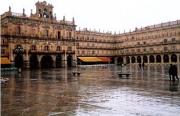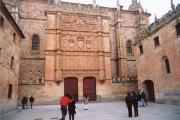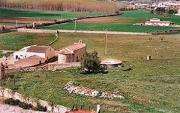Salamanca, one of Spain’s most famous old cities, also provides easy access to Zamora and Ciudad Rodrigo. Salamanca is often called the most gracious city in Spain. I think ‘grandest’ is more apt and I should apply the term ‘gracious’ to the other two.
|
 |
 |
 |
 |
 |
 |
 |
 |
Plaza Mayor, Salamanca - rained out
 |
 |
Salamanca lays claim to perhaps the grandest Plaza Mayor in all Spain. Photos usually show it teeming with people, as it was ten minutes before mine. Then the sky and subsequently the Plaza emptied. All the best buildings in Salamanca are of a beautiful honey coloured sandstone and the city is built on a hill top so there is a view of it for some considerable way. The University buildings make up in quality for what they lack in extent and the well known Casa de Conchas [House of Shells], once a hostal for pilgrims to Santiago de Compostela, now stands as a public library. The vast baroque church of Santa Clerecia looks big and looming by day but makes a wonderful sight when floodlit. The cathedrals, old and new are impressive, though to my mind they don’t hold a candle to two other buildings. The first of these is the Convento de San Esteban [St Stephen], both the interior and the cloisters through which you enter being particularly lovely. The other is El Convento de Las Dueñas, where the finest cloisters in the city are to be seen with the cathedral behind them. Now we flit to Zamora, about an hour away by bus. Here is might be helpful to say that, whatever maps in guidebooks may seem to show, there is no rail link between the two cities and that, if you are changing between road and rail in Salamanca, you need to allow a good while as they are far apart and the traffic is cruel. To my mind the entries in guidebooks cracking up the western part of the city are not particularly helpful unless they depict it as a pleasant add-on if time allows. The fact that the main sites are all in a small area in no way detracts from them and anyone with limited time should be well satisfied with staying around that area. One memorable feature of my visit was a free concert in an old church just off the Plaza Mayor.
|
|
| Favourite spots: |
 |
 |
![Las Dueñas cloisters [cathedral behind] Salamanca Las Dueñas cloisters [cathedral behind] Salamanca](/data/reportpix/thumb/salamanca-report-1478-5.jpg) |
 |
 |
 |
 |
 |
Las Dueñas cloisters [cathedral behind] Salamanca
 |
 |
Zamora was known as La Cercada [the closed one] because of its near impregnability behind its walls on the hill. Below, there is a Roman bridge over the river Duero [Portuguese Douro]. Its cathedral is a most impressive building from the outside. It was the dreaded Monday so that’s as much as I know. There is no other outstanding individual sight but the number of Romanesque churches within a very short distance of the centre is quite prodigious, and, had it been a different day, I should have particularly liked to see the Museo de la Semana Santa attached to Santa Maria church. The statues paraded through the streets in that week are said to be awesome. Outside of the walls is a tiny plain chapel where El Cid is said to have worshipped. A minor feature at Zamora that I enjoyed tremendously was being able to get amazing views of storks’ nests from above and close up. Zamora is connected by bus three times a week with Portuguese Bragança.
|
|
| What's really great: |
 |
 |
![Ayuntamiento [Town Hall] Ciudad Rodrigo Ayuntamiento [Town Hall] Ciudad Rodrigo](/data/reportpix/thumb/salamanca-report-1478-4.jpg) |
 |
 |
 |
 |
 |
Ayuntamiento [Town Hall] Ciudad Rodrigo
 |
 |
I don’t know to what extent it was because of its being a Sunday but Ciudad Rodrigo was so utterly peaceful and made a real change from the bustle of Salamanca. This seems very much like a frontier city, although Portugal is actually some miles farther, gracious and almost timeless with coats of arms gracing so many buildings. You might think that the ecclesiastical buildings might seem tame after Salamanca but the cathedral cloisters have some terrific stone carvings around the base of the pillars. Entering the city through a gate in its huge stone walls near the bus stop is a magical feeling and there is a fine open square just inside, good for a picnic, surrounded by old buildings and spectacular coats of arms.
|
|
| Accommodations: |
 |
 |
 |
 |
 |
 |
 |
 |
University building,
Salamanca
 |
 |
I had real problems in Salamanca with so much of the cheaper accommodation being several floors up not dicky-ticker friendly. Eventually I settled at the Pensio Barez at c. Menendez 19, between the Plaza Mayor and the University. Toilets and showers are shared but the proprietor ensures that nobody is kept waiting long. It’s nothing fancy but i would cheerfully go again as it so very friendly and helpful.
Phone: (00 34) 923 21 74 95
|
|
| Restaurants: |
|
I liked the Restaurante Roma at c/Ruis Aguilera behind the Plaza Mayor, recommended in the Rough Guide.
|
|
| Other recommendations: |
 |
 |
 |
 |
 |
 |
 |
 |
El Cid worshipped here, outside walls, Zamora
 |
 |
Some of the buses to Zamora go on to León. This is a splendid modern city but it also contains a number of excellent older sights. The cathedral’s windows are as spectacular as any I’ve seen anywhere and next to the old and gracious Basilica of San Isidoro is a true marvel in miniature [photos rightly not permitted]. This is the Pantheon of the Kings of León. The old books in the Library and the jewelled artefacts in the Treasury are stupendous but above all is the wonder of the painted ceilings, unseen for hundreds of years but with colours as good as if they had been applied today, the humour as well as the talent of the painters shws clearly.
The Parador at the old San Marcos monastery, later the headquarters of the Order of St James, is said to be one of the most spectacular in Spain and Gaudi’s ‘Casa de Botines’ is also well worth seeing.
|
|
Published on Monday January 3th, 2005
|
|
 Publish on Facebook
Publish on Facebook
|
Thu, Jan 27 2005 - 06:16 AM
 by ardelia
| I am dying to visit this place...thi is so interesting! |
Tue, Jan 04 2005 - 02:18 AM
 by ravinderkumarsi by ravinderkumarsi
hii david,
this is really a nice report .
ravi |
Mon, Jan 03 2005 - 07:07 PM
 by mistybleu by mistybleu
Hello David,
I really enjoyed your report (as with the other your have published), keep them coming.
Rgds Misty ((*_*)) |
| Information: |
| Login if you are a member, or sign up for a free membership to rate this report and to earn globo points! |
|

|
